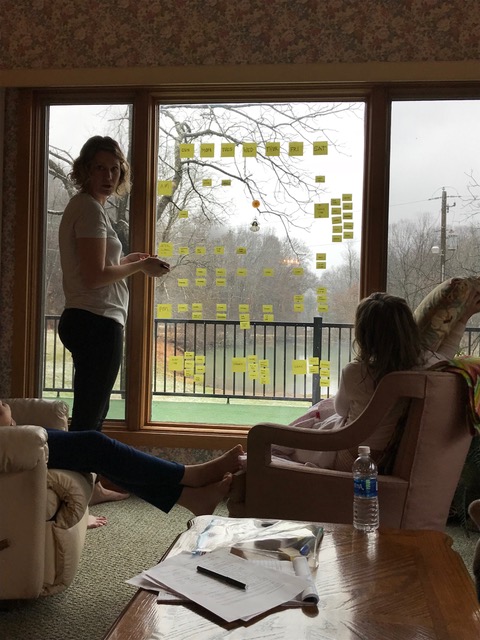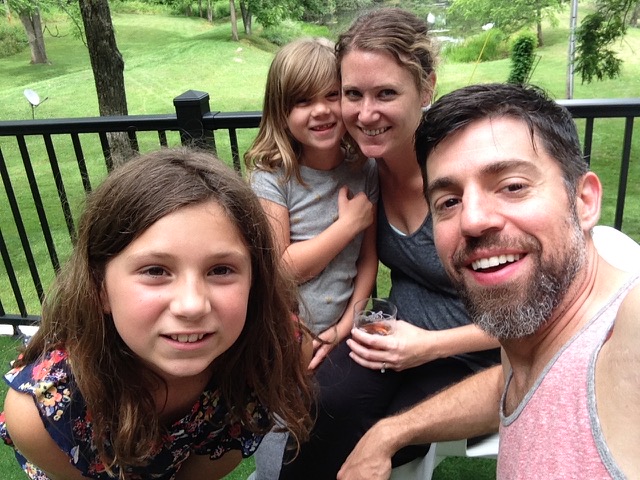
Jonathan Seeds is an interesting man, and embodies one of my favorite personality traits: he’s earnest. You’ll get no posturing for coolness from Jonathan (which, ironically, makes him undeniably cool), and he means every word he says. Jonathan is not only a wonderful guy (video producer, family man with two little girls), he’s a wonderful runner, too. When I was recently training for a ridiculous, over-reaching race a friend roped me into, Jonathan happily trained with me (an aside: how rare is it to find a good runner who deigns to run with us slow losers without being uppity and whiny about it!? And yet Johnny boy will do so, any day, anywhere. He’s about the people! Bless him). Our conversation went to such interesting places, I stopped him, whipped out a recording device (read: phone), and let him expound. I thought you all might be interested in his wisdom:
Steven Manuel: [panting, wheezing] Tired yet?
Jonathan Seeds: No.
SM: Good; I thought so. [panting more] It’s part of my plan to make you, uh… make you think I’m out of shape. Then I surprise you in the second half.
JS: I look forward to that.
SM: Right. Well. Okay Jonathan, you and your wife Meredith just did a Goals Summit that you said was a huge success. And I know that, for some people, to go do that kind of thing seems a lofty goal. But I know that your story didn’t start there… What was the first step for you in understanding that, by being a husband and father, God had put you in a place of leadership.
 The Seeds family goals summit!
The Seeds family goals summit!
JS: Yeah. I think what really got the ball moving downhill for me was getting my family’s architecture and hierarchy right. I’d been really passively a member of the family, passively fathering, passively being a husband. And it wasn’t until…
SM: Does that mean that you were just a nice guy? That you never brought conflict or challenge into your home?
JS: Yeah totally. I was the “kind and safe guy” that was modeled to me by my father. I just didn’t have any really good examples of leadership. So when I heard people talking about “leading a family”, I really didn’t have a good idea of what that looked like, other than sort of a mixed-up cultural picture of men abusing power, bad bosses, TV villains… So when I started to be hungry to lead my family and actually step into that role… I was really scared. And I had to find and really reach out to lots of different dads, lots of different husbands and ask them some hard questions like, “What does it look like to lead your family?” “How do you avoid being a tyrant or ogre?” “And how do you love? Love in a way that actually brings order and discipline in a healthy way?”
And the the other side of the coin was actually getting my wife–who had been leading the family–to trust me and to be led by me. She was leading the family just because I had abdicated the throne. And it played out in the subtlest ways, day to day: like, who answers the door when people come over? Who orders food for the family? Who’s the first person to talk to the hostess at a restaurant? Who makes the decision about what the kids are going to be involved in after school? You know, all these little things.
And we didn’t have a dialogue about them at all. I wasn’t even really that interested. So part of me kind of reclaiming the reins in a really healthy way was showing her that I was trustworthy to even have conversations about that stuff, and trustworthy enough to actually make decisions for her and for my family.
SM: Was she dubious of this great announcement of yours, “Darling, I’ve decided I’m going to Lead The Family now”?
JS: Pff! Oh yeah! I knew I couldn’t make a great announcement like that; That’s not the way she receives anything. So I had to show her over years that I was trustworthy: taking care of myself first, and then slowly, little by little, showing her that I was trustworthy of taking care of her. Serving her. You know, I had an important realization many years ago that acts of service were a way that I could show her affection. I didn’t know this when I married her. But as I learned to take care of myself and make wise decisions for myself, I was able to start to serve her in a wise way.
SM: What do you mean when you say take care of yourself?
JS: One of the things I think about is my own hunger for healing from the LORD. I didn’t realize how broken I was until everything fell apart. Now THAT was Ground Zero. I almost lost Meredith, and I almost lost my family due to an affair and pornography addiction. So when that busted… like, I had to rebuild everything and I couldn’t hide anymore. I had to heal. I just couldn’t live the life I was living anymore. I needed Jesus. And he showed up.
SM: Did you have access to Jesus before your life fell apart?
JS: Yeah… but I didn’t realize I needed Him, ok? …until everything was almost taken away and I realized how incredibly powerless I was and how prideful I had been to think I had this double-life situation figured out on my own and could control everything. I didn’t have a choice but to rebuild myself in a way that allowed God to bring me to the end of the person I can be on my own. Like, I couldn’t trust myself anymore. I needed to get help. I needed to surround myself with good guys and I needed to bring everything into the light all the time. And I knew I needed more and more healing. And when I say “take care of myself” it means, like, deal with spiritual and emotional immaturity. Deal with my strongholds, and the things that have gripped me. Instead of being passive, be at war with them every day. Being hungry to just fight those battles, finally. Being an integrated man, not being two different people, like one person at work, one person at home; or one person with my family, one person with my friends… So when I talk about taking care of myself it’s bringing that into a place of wholeness, realising that I am loved by God first and foremost. And when I can receive that, I can love my wife, love my kids. Only then I can love them you know. And I think taking care of myself is realizing that I’m a son, realising that I’m loved by God, and I’m not settling for second place, in terms of my own healing, my own emotions, my own spiritual growth.

SM: Yeah. So never settling, continually pushing for healing. That makes a lot of sense. And you’re saying that you had to get yourself in order before there was order in your home. I know you’re super tied in with other men, and have had leaders above you who’ve helped you a lot. Do you think that finding mentors has been an important part of you getting in order?
JS: Absolutely. Absolutely. I’m very lucky to to be connected, via work and church, to people who have been thinking about this stuff for a long time. Even just thinking about healthy ways to lead their family. People like Jeremy Pryor and Justin Wolfenberg and Daniel Armstrong… These are the first people who introduced me to the concept of leading in a way that was something other than, you know, the cultural vision of leadership. It was the Biblical model of leadership.
SM: And what does that mean, “the Biblical model of leadership”?
JS: Well there’s a really good question. You know the picture the Bible paints is that the husband is the head of the wife like Christ is the head of the Church. So when that that particular grouping is out of whack, things go sideways. In a hurry. And it’s compounded, I think, when there’s children. It’s a system wherein, if something goes out of whack at the front, it’s gonna go REALLY out of whack at the back. So, in my relationship with God, if I’m not trusting Him as the Leader of my life, then my wife’s going to have a whole lot of trouble trusting me as the leader of our family. And our kids are going to have a whole lot of trouble figuring out who’s in charge. So I think that simple picture, for me, is the model. But in terms of, what are the behaviors of Biblical leadership, I think that’s more multifaceted. It’s more complex. We have lots of patriarchs in the Bible, you know. And they’re all broken. But we know that God works through generations. We know that when he looked at Abraham he saw freedom for His people, and we know that being a father is really important in that model. Father is a very very important role to inhabit. They’re supposed to give experiences to their family, to their wife, that show how good it is to protect their family, to provide for their family. And to not stand passive. Not to stand in fear but to have trust. So when you ask what’s a Biblical model for a family, and a father specifically, these are things that are important to me. They stick out to me, because I never saw them when I was growing up. But I’m able to connect with them now. And even though I haven’t seen all these things personally in my life through a father, these mentors have showed me what it looks like, and I’ve seen the fruit in their lives. And that gives me a chance to at least try it on my own. And while there’s some times I fail, there’s other times that I’ve had wild success. Praise God. And you know, I’m learning that my way of leading my family is very different than yours or Jeremy’s or Justin’s and it’s because we’re wired so differently. But there’s some principles like being the protector, being the provider, being the teacher in your family, discipling your children, not accommodating fear in any aspect of your life, being connected to things like property and meal times… I think those are patriarchal things that have a… significance. Those are common among all of us and Biblical no matter who you are.
SM: I would love to hear some specifics about when the order of your home plays out, like at mealtimes.
JS: Certainly. I’m lucky to have come from a sort of old world-ish family where mealtimes were really the centerpiece of everyday…
SM: The Palestinians!
JS: Yeah yeah yeah. So ours was a multigenerational Palestinian Christian family, where my grandparents lived upstairs and my brother and mother and father and I lived downstairs. And the six of us would eat dinner every night. My grandma and mom would take care of dinner. Every night, we sat as a family for typically an hour. And had dinner every night. And I thought everyone did that. Until we started to watch sitcoms, and I go to my friends’ houses and I’m like, “Why are people sitting in front of the TV eating every night?” And I didn’t even realize how important that was for me, to be connected to my family, to hear everybody talk and listen. There were often guests at the table, too, like three nights a week. So I got introduced to like lots of different people. My grandmother was really the ringleader of the whole thing. So it was very matriarchal. But everybody felt very well taken care of, all the time. Everybody had too much, you know? It was great. That value of the meal was just indelible, indelible in my soul. And it returned, really, when I started to take my role as the leader of my family seriously. That was one big thing: we WILL do “meal time”. We WILL do “dinner”. There will be no paper plates, no empty seats… we won’t be in front of the TV… And there’s a pull. There’s a pull for that. …And I’m not saying we never do that. Once in a while we eat in front of the TV, and it feels like such a bizarre luxury.
SM: Yeah but it’s not the norm.
JS: Right, when it comes to dinner time we set the table and eat at the table. And that’s just what we do. I tend to cook most of the meals because, if I want that value to stick, I’ve got to make it happen. Meredith and I both work. And it’s difficult. But we do it. We have to plan, and we have to move quickly, to be able to sit down and rest and relax.
SM: What’s another practical way that leadership happens in your home, after meal times?
JS: Well, I learned–slowly–that I didn’t need to make ALL the decisions in my family. Meredith is very well-equipped to make decisions. She’s a very capable person. Incredible, really. And I’m learning how incredibly powerful a wife is, who’s resourced and joined in vision with her husband. My understanding of leadership is constantly changing as more is being revealed. For example, we bought a house this year. One of the things Meredith has always wanted to do is design the full interior of her own home. Like, something more than just picking paint colors. And design is important to me too, but that wasn’t going to happen by itself. So we looked specifically for a home that we could fix up and I wanted to resource her to to bring her creative vision and skills and abilities to bear for our family. So we made sure to find a house that was crappy and needed work. And we made sure to find a house that was priced so that we could afford to do renovation work. In the past we’d bought too much house and limited ourselves. So we made a different kind of decision on which house so that Meredith could make more creative decisions. We talked about it but she chose all the finishes and it was her project. And it was incredible; she got to be in her element and she got to craft a home that included a kitchen remodeled just for me! So resourcing a wife in a Biblical family model resources the whole family. That extends who we are as a family into new places, for more people, in a better way. And it produces fruit every day of every week! If I don’t have this mindset of resourcing her, what’s she doing? She’s grabbing for opportunities and pushing me around. Then I feel resentful about what she’s doing, etc. etc. But I had a completely different frame of mind here. And it’s paid off for both of us. I want to do THAT more. I want to figure out how we can give her, someday, an entire house to design from scratch. Or design a business from scratch. I just want to give her opportunities to do her specific thing in a way that doesn’t just gratify her but truly gives life to our whole family. Basically, it’s a different way of leading than just telling her what to do.

SM: Yeah that’s powerful. The idea of bringing family assets together–which includes all the gifts and skills and callings of every family member–in a way that pushes the family vision and culture forward is kind of a game changer. Sometimes, I see families constructed around something way more limiting, which is just a handful of people working toward dad’s vision. In a way, that’s better than the worldly option of everybody just pleasing themselves, but it’s also less than the idea that we’re all called in a direction together, but each person in the family goes in that direction in their fullness and empowers the whole family to go farther with more power and beauty and creativity. THAT is exciting to consider, and it sounds like you and Meredith are cracking that nut. Wow, praise God.
Okay, last thing for now: Can you tell us the one one financial learning or tip that you would pass along to a younger guy who’s starting down the road that you’re now walking?
JS: Well, yeah, sure. It’s it’s simple and stupid, but great. Here it is: Want what you have.
SM: Very Confucius.
JS: It’ll save you from debt and credit. Just think about what credit and leveraging and that whole world is about: Wanting things you don’t have. And if you if you follow that train into the tunnel… it’ll just take you to failure. And look, I’m the first offender. I tell myself this every day. It’s practicing gratitude daily, then also on birthdays and holidays.
SM: What do you mean, “practicing gratitude”?
JS: Okay, look, I have an economical Mazda wagon. You know how much I dislike that car. And when we first got it how much we made fun of that car. It is SO not cool. …but we’ve since turned our hearts to believe this is a very practical and a useful thing–a very important thing for our family. And when there’s six people in there and we’re all singing, it’s the best thing in the world. And it doesn’t break the bank! Now, sure: I want the Jeep. Sure I do. Yeah, with the little lift job, the oversized tires, and the removable doors. Yeah that. But even better is that I want what I have! I have a Mazda!
SM: And you have a home that’s in order.
JS: More and more I do. And I tell ya, it’s the greatest thing ever. I don’t ever want to go back.
SM: Thank you Jonathan, for sharing your wisdom.
JS: It’s my pleasure. Shall we get back to the run you interrupted for this impromptu interview? We have miles to cover.
SM: Well I was trying to postpone that pain for as long as possible…!
JS: Well there might be a metaphor here: Avoid it if you want but that pain is going to be sitting right there waiting for you…
SM: We’d better kill it now so we can get on with our lives.
JS: Good call.







My father modeled ‘kind and safe’ for a good reason – he had an overbearing, harsh dad, and saw how sensitive I was from a really young age. That perception alone shows his heart. He didn’t want to break my spirit, the way he was broken. He has always, and continues to model gentleness and patience to me —even as a full grown man — in a way that is truly rare and beautiful.
That’s tremendous Jonathan and I honor your dad in knowing you and protecting you. My father also made massive strides forward in the generational line, but I know it’s on me to take the ball even further down the field. My father wants me to learn the lessons of His life, then build on them to take the family to greater heights- which is precisely what I intend to do. Praise God for good dads!
Wonderful article. The comments above really resonate also- this idea of taking ground in the generational line. I have often felt (still do if I GOTTA be honest) like I haven’t led my family anywhere nearly as well as I see others leading. Then I think about my Dad growing up without a Dad in the home, but in the same tiny town and behaving irresponsibly, bumming money including from my Dad when he was just a young boy. My Dad not only had no Dad in the home but had a role model of one exhibiting the ultimate passive spirit. Yet my Dad was a great Dad, maybe not understanding the concepts you guys are talking about but big-time advancing the ball. I’ve tried to do that as well especially on the Jesus end of things. Now my son and three daughters are all in their 20’s and pretty much on their own and I no longer have the opportunity to love my wife in the same way. So… I am focused on finding ways to lead and love in the current season, with the hope that my kids will be primed to take further ground by the way they operate their families. I think its important to observe that all of we husbands/fathers’ stories are different and our job is not to have a family which looks like someone else’s whom we may admire, but rather to lead as our Father intended in whatever generational line He has dropped us into.
Excellent Steve. I’ll also say this: if 1) you find that you have limited access to your family for whatever reason, and 2) you have new revelation that you WOULD have applied to your family if you could have… then take all that fathering excellence and use it for JESUS’ family! Serve somebody else’s family with support and pastoring!